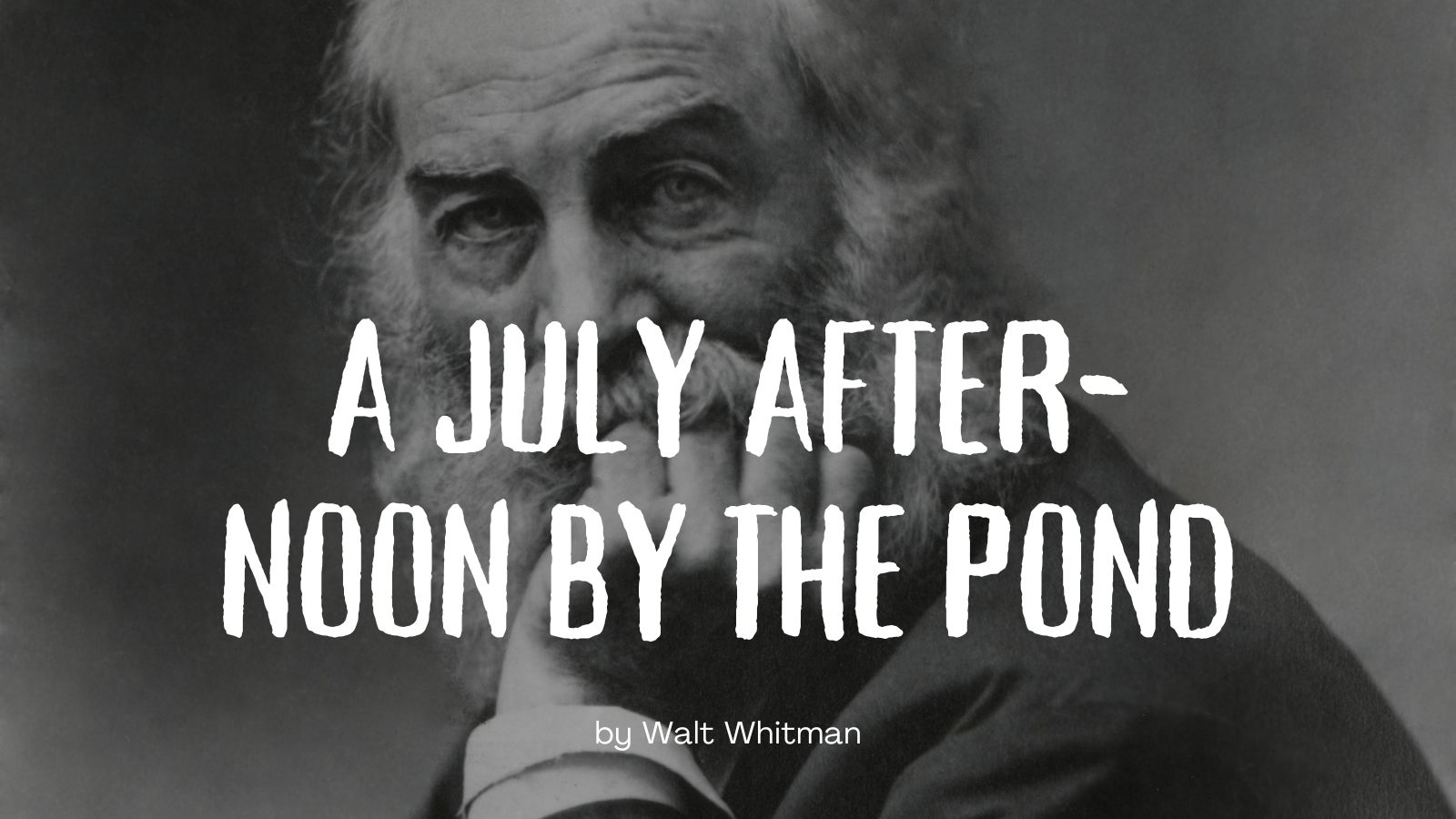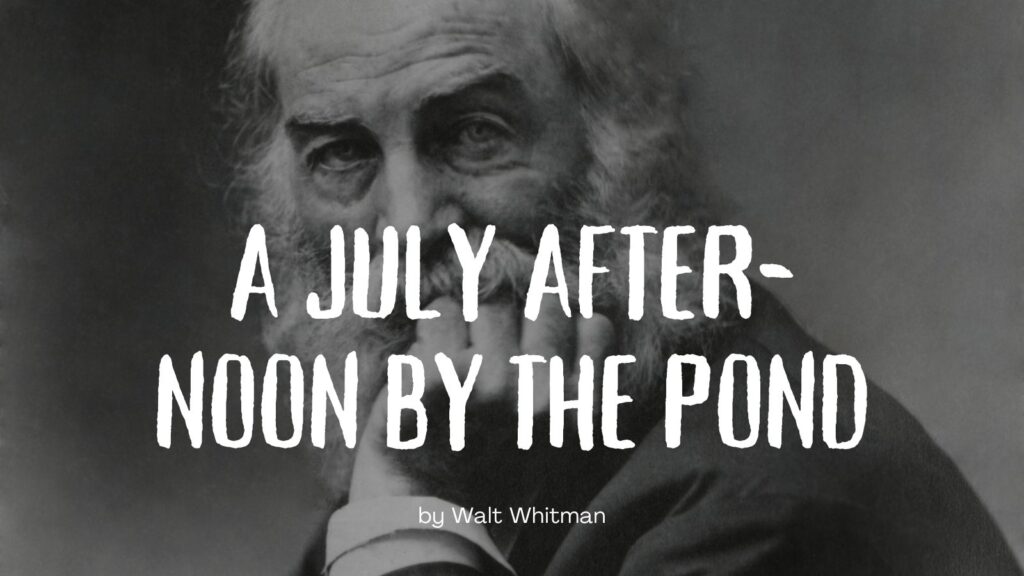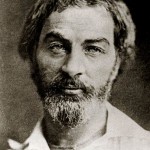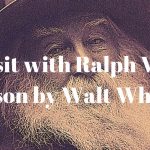A JULY AFTER-NOON BY THE POND by Walt Whitman
Originally published July 14, 2010 | Updated April 4, 2025
Introduction: Whitman’s Window to Nature
Walt Whitman (1819-1892), often called America’s first poet of democracy, was known for his ability to transform ordinary moments into extraordinary reflections on human existence. “A July After-Noon by the Pond” exemplifies Whitman’s remarkable talent for immersive nature writing, capturing a seemingly simple summer scene with remarkable precision and depth.
Written during the latter part of Whitman’s career, this prose poem demonstrates his mature observational style—where the boundary between the poet and his environment dissolves. The piece originally appeared in Whitman’s collection “Specimen Days” (1882), where he compiled various autobiographical fragments, nature observations, and Civil War memories.
What makes this work particularly significant is how it showcases Whitman’s democratic vision of nature—where insects, birds, plants, and atmospheric conditions receive equal attention and dignity. Through his meticulous descriptions, Whitman invites readers to slow down, observe, and appreciate the intricate details of the natural world that often go unnoticed in our hurried lives.
As we read this piece today, over 140 years after it was written, Whitman’s careful observations remind us of a time before digital distractions, when sitting by a pond on a summer afternoon constituted not just leisure, but a profound spiritual and intellectual experience. His words continue to resonate in our environmentally conscious era, reminding us of the value of mindful connection with the natural world.
A JULY AFTER-NOON BY THE POND
The fervent heat, but so much more endurable in this pure air—the white and pink pond-blossoms, with great heart-shaped leaves; the glassy waters of the creek, the banks, with dense bushery, and the picturesque beeches and shade and turf; the tremulous, reedy call of some bird from recesses, breaking the warm, indolent, half-voluptuous silence; an occasional wasp, hornet, honey-bee or bumble (they hover near my hands or face, yet annoy me not, nor I them, as they appear to examine, find nothing, and away they go)—the vast space of the sky overhead so clear, and the buzzard up there sailing his slow whirl in majestic spirals and discs; just over the surface of the pond, two large slate-color’d dragon-flies, with wings of lace, circling and darting and occasionally balancing themselves quite still, their wings quivering all the time, (are they not showing off for my amusement?)—the pond itself, with the sword-shaped calamus; the water snakes—occasionally a flitting blackbird, with red dabs on his shoulders, as he darts slantingly by—the sounds that bring out the solitude, warmth, light and shade—the quawk of some pond duck—(the crickets and grasshoppers are mute in the noon heat, but I hear the song of the first cicadas;)—then at some distance the rattle and whirr of a reaping machine as the horses draw it on a rapid walk through a rye field on the opposite side of the creek—(what was the yellow or light-brown bird, large as a young hen, with short neck and long-stretch’d legs I just saw, in flapping and awkward flight over there through the trees?)—the prevailing delicate, yet palpable, spicy, grassy, clovery perfume to my nostrils; and over all, encircling all, to my sight and soul, the free space of the sky, transparent and blue—and hovering there in the west, a mass of white-gray fleecy clouds the sailors call “shoals of mackerel”—the sky, with silver swirls like locks of toss’d hair, spreading, expanding—a vast voiceless, formless simulacrum—yet may-be the most real reality and formulator of everything—who knows?
Historical Context: Whitman’s America
When Walt Whitman penned “A July After-Noon by the Pond” in the late 19th century, America was undergoing profound transformations. The nation was still healing from the deep wounds of the Civil War (1861-1865), a conflict that had deeply affected Whitman, who had served as a volunteer nurse tending to wounded soldiers. This experience fundamentally shaped his worldview and his writing, infusing his later work with an intense appreciation for life’s simple pleasures and natural beauty.
The 1870s and early 1880s marked America’s Gilded Age—a period of rapid industrialization, urban growth, and technological innovation. Cities were expanding, factories were multiplying, and the American landscape was being dramatically altered by human intervention. Railways crisscrossed the continent, telegraph lines connected distant communities, and the pace of life was accelerating in unprecedented ways.
Against this backdrop of modernization, Whitman’s detailed observations of pond life represent more than mere nature writing—they offer a deliberate counterpoint to industrial progress. His mention of “the rattle and whirr of a reaping machine” in the distance serves as the only human intrusion into an otherwise pristine natural setting, highlighting the contrast between mechanized farming and the untouched ecosystem of the pond.
This period also saw the emergence of Transcendentalism as an influential philosophical and literary movement in America. Led by thinkers like Ralph Waldo Emerson and Henry David Thoreau, Transcendentalists emphasized the inherent goodness of both people and nature, advocating for a deep spiritual connection with the natural world. While Whitman was not formally aligned with the Transcendentalists, his work shares their reverence for nature and their belief in its spiritual dimensions.
Whitman was writing at a time when American literature was establishing its own distinct identity, separate from European traditions. His innovative free verse and democratic vision helped define what American poetry could be. In pieces like “A July After-Noon by the Pond,” we see his distinctly American voice—observant, democratic in its attention, and deeply engaged with the specific details of American landscapes.
By the time this piece appeared in “Specimen Days,” Whitman was in his sixties and dealing with health issues following a stroke. His keen attention to the vitality of nature in this work perhaps reflects his own awareness of mortality and his desire to capture life’s fleeting beauty with precision and gratitude.
Why This Piece Matters: The Enduring Significance of Whitman’s Pond Meditation
“A July After-Noon by the Pond” might appear deceptively simple at first glance—just a poet’s casual observations of a summer day. However, this concise prose poem carries significant literary, philosophical, and environmental importance that continues to resonate with readers today.
Literary Innovation
This piece exemplifies Whitman’s revolutionary approach to American literature. Unlike the formal, structured poetry that dominated before him, Whitman’s prose-poetry hybrid form broke new ground. His democratic attention—giving equal weight to dragonflies, pond water, clouds, and farm machinery—represents a radical literary egalitarianism that transformed American writing. This approach influenced countless later writers, from the Imagist poets of the early 20th century to nature writers like Annie Dillard and contemporary environmental essayists.
Mindfulness Before Its Time
Long before mindfulness became a cultural phenomenon, Whitman practiced and documented a form of complete presentness in nature. This piece serves as a masterclass in attentive observation—noting minute details like the “tremulous, reedy call of some bird” and the “white and pink pond-blossoms, with great heart-shaped leaves.” In our age of digital distraction and nature deficit disorder, Whitman’s focused attention offers a powerful alternative way of engaging with the world.
Environmental Documentation
Beyond its literary merits, the piece functions as an ecological snapshot of a specific time and place. Whitman carefully catalogues flora (calamus, clover), fauna (water snakes, blackbirds, bees), and atmospheric conditions with scientific precision. This makes his work valuable not just to literary scholars but to environmental historians tracking changes in American ecosystems over time. His observations of “the pure air” and “the fervent heat” take on new significance in our era of climate change and environmental degradation.
Philosophical Inquiry
The piece culminates in a profound philosophical question—observing the sky as “a vast voiceless, formless simulacrum—yet may-be the most real reality and formulator of everything—who knows?” This leap from minute observation to metaphysical contemplation demonstrates how Whitman used nature as a gateway to deeper questions about reality, perception, and human understanding. His willingness to dwell in uncertainty (“who knows?”) offers a humble model of philosophical inquiry that remains refreshing and relevant.
Democratic Vision
Whitman’s approach to nature reflects his broader democratic ideals. By giving voice and significance to ordinary moments and overlooked creatures, he enacts on the page the same inclusive vision he hoped for in American society. His pond is a microcosm where all beings have value and deserve attention—a natural democracy that mirrors his hopes for human communities.
In an age of environmental crisis, digital overwhelm, and political division, Whitman’s patient, democratic attention to the natural world offers more than just literary pleasure—it provides a model for reconnecting with our environment, ourselves, and each other.
Walt Whitman: A Brief Biography
Walt Whitman (1819-1892) stands as one of America’s most influential poets and a pivotal figure in the transition to modern literature. Born on Long Island, New York, to a working-class family, Whitman held various jobs throughout his life—printer, teacher, journalist, government clerk, and volunteer nurse during the Civil War.
His masterwork, “Leaves of Grass” (first published in 1855 and continuously revised until his death), revolutionized American poetry with its free verse style, candid expression, and democratic vision. Unlike the formal European-influenced poetry of his time, Whitman’s verse celebrated the common person, the American landscape, and the human body with unprecedented openness.
The Civil War profoundly shaped Whitman’s life and work. While volunteering in army hospitals in Washington D.C., he witnessed immense suffering that deepened his compassion and informed his later writing. This experience led to his collection “Drum-Taps” (1865) and influenced the more contemplative tone of his later works, including “Specimen Days” (1882) where “A July After-Noon by the Pond” appeared.
Though controversial in his lifetime for his frank celebrations of sexuality and the body, Whitman is now recognized as “America’s poet” whose democratic ethos and innovative style influenced generations of writers worldwide. His famous declaration—”I am large, I contain multitudes”—captures the expansive spirit that made him a literary pioneer and an enduring voice in American culture.
Further Reading: Exploring More of Walt Whitman
If you enjoyed “A July After-Noon by the Pond” and want to discover more of Whitman’s work, here are some recommended readings that showcase different aspects of his genius:
Essential Whitman Collections
- “Leaves of Grass” – Whitman’s masterpiece, particularly the deathbed edition (1891-92), represents his complete vision. Begin with iconic poems like “Song of Myself,” “Crossing Brooklyn Ferry,” and “I Sing the Body Electric.”
- “Specimen Days” – The complete journal where “A July After-Noon by the Pond” appears, offering more of Whitman’s nature observations alongside his Civil War experiences and reflections on American life.
- “Drum-Taps” – Whitman’s powerful collection of Civil War poems, including the famous elegy for Abraham Lincoln, “When Lilacs Last in the Dooryard Bloom’d.”
Similar Nature Writings
- “The Sleepers” – A dreamlike poem that, like “A July After-Noon,” demonstrates Whitman’s ability to move between concrete observation and cosmic contemplation.
- “This Compost” – One of Whitman’s most ecologically aware poems, exploring the cycles of nature and humanity’s place within them.
- “A Sun-bathed Nakedness” – Another brief prose meditation from “Specimen Days” that captures Whitman’s reverence for the natural world.
Modern Perspectives on Whitman
- “Walt Whitman: A Life” by Justin Kaplan – The definitive biography that contextualizes Whitman’s work within his life and times.
- “The Better Angel: Walt Whitman in the Civil War” by Roy Morris Jr. – Explores how Whitman’s wartime experiences shaped his writing and worldview.
- “How to Make a Soul: The Wisdom of John Keats” by Ed Hirsch – Contains insightful comparisons between Whitman and other nature poets across different traditions.
- “The Portable Walt Whitman” edited by Michael Warner – An excellent introduction to Whitman’s diverse writings with helpful annotations.
Digital Resources
- The Walt Whitman Archive – A comprehensive online collection of Whitman’s work, including manuscripts, letters, and scholarly analysis.
- Library of Congress Whitman Collection – Digitized manuscripts and documents from America’s national library.
Whether you’re interested in Whitman’s celebrations of nature, his democratic vision, his personal journey, or his literary innovations, these resources offer pathways to deeper engagement with one of America’s most influential poets.
- 100 Screenwriting Ideas to Get You Writing - January 20, 2026
- 100 Winter Storm Writing Prompts - January 17, 2026
- 100 Haunted House Story Starters: Craft Your Scariest Tale Yet - January 10, 2026





